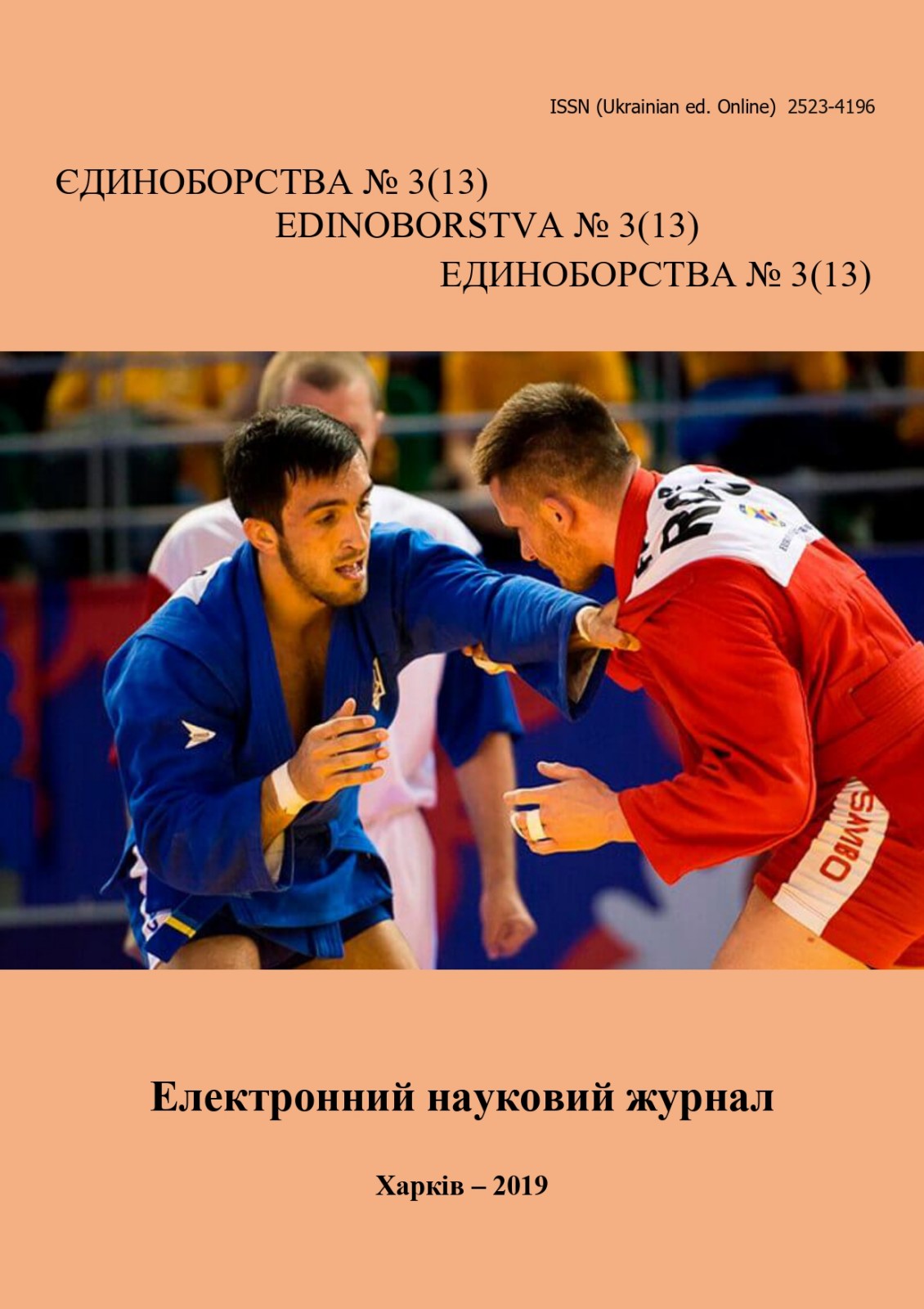Study of methods of regulation of positive emotions in martial arts
DOI:
https://doi.org/10.15391/ed.2019-3.01Keywords:
wrestlers, psychological skills, methods, best athletesAbstract
Purpose: To propose methods that lead to positive emotional reactions in martial arts, which can be used in the preparation of wrestlers. To accomplish this goal it is necessary to solve the following tasks: to study the features of the psychological skills of a successful athlete, using a questionnaire survey of martial arts trainers to identify methods that work with during the psychological training of martial arts, to analyze existing methods that lead to positive emotional reactions to martial arts. Material and methods. For the struggle is characterized by extremity not only competitive, but also training situations that carry significant mental stress. When analyzing competitive activities, the psychological component acquires special significance - moral behavioral, motivational alternatives and the associated emotions of athletes. Research methods: theoretical analysis and synthesis of scientific and methodological literature; an aerial survey of 40 coaches in various types of martial arts; methods of mathematical statistics. Results. The study of the characteristics of the best athletes is necessary to create a formalized «champion model», which is often served as a set of model characteristics of various sides of preparedness. The problem of research and the optimal correction of the mental state in the sport of higher achievements has always been one of the most important in practical terms and one of the most difficult in theory. This problem is particularly relevant in the struggle, which is characterized by complex interactions of physical and mental factors, high emotional tension of activity. There are many talented athletes who will spend their lives wondering why they are not able to achieve the high level of sport that they aspire to. This often happens simply because they do not have the qualities characteristic of high performance athletes. Conclusions. Thus, the experience gained by the traditions of world combat in the field of psychological training is the richest reserve for increasing the level of sporting achievements, including judo. There is a steady interest in the study of psychological skills. Especially popular are methods that lead to positive emotional reactions, which allow to determine a whole range of psychological skills.
References
Алексеев, А. Ф., & Ананченко, К. В. (2007). «Причины возникновения травм у дзюдоистов и их профилактика». Слобожанський науковоспортивний вісник, (11), 106-108.
Ананченко, К. В., Бойченко, Н. В., & Панов, П. П. (2017). «Вдосконалення координаційних здібностей юних дзюдоїстів». Єдиноборства, (3), 4-11.
Ананченко, К. В., & Хацаюк, О. В. (2018). «Особливості тренувального процесу та техніко-тактичної підготовленості дзюдоїстів-ветеранів». Единоборства, 4-18.
Бойченко, Н. В., Станкевич, Б., & Дрозд, М. С. (2014). «Контроль за станом підготовленості борця». Проблемы и перспективы развития спортивных игр и единоборств в высших учебных заведениях, 1, 14-17.
Волков, И. П. (1994). «Задачи и формы психологического обеспечения высококвалифицированных спортсменов к соревнованиям». Научные исследования и разработки в спорте, № 1, 5 – 10.
Воронова, В. І. (2007). Психологія спорту: Навч. посібник. Олімпійська література, Київ.
Гинзбург, М. Р. (1994). Психологическое содержание личностного самоопределения. Вопросы психологии, №3. 55-63.
Зайцева, Т. В. (2002). Теория психологического тренинга. Психологический тренинг, как инструментальное действие. СПб.: Речь, Смысл, Москва.
Коробейников, Г., & Орденов, С. (2005). «Диагностика психофизиологического состояния дзюдоистов высокой квалификации». Проблемы и перспективы развития спортивных игр и єдиноборств в высш. учебн. зав., 78 – 80.
Пакулін, С. Л., Ананченко, К. В., & Ручка, Є. В. (2016). «Вдосконалення техніко-тактичної та психологічної підготовки борців вільного стилю». Traektoriâ Nauki = Path of Science, 2 (12), 9.1-9.12. doi: 10.22178/pos.17-14
Романенко, В. А. (2005). Диагностика двигательных способностей. «Новый мир», УКЦентр, Донецк.
Тропин, Ю. Н., & Бойченко, Н. В. (2017). «Содержание различных сторон подготовки борцов». Единоборства, 79-83.
Fournier, J., Calmels, C., Durand-Bush, N., & Salmela, J. (2005). Effect of a season–long PST program on gymnastic performance and on psychological skills development. International Journal of Sport and Exercise Psychology, 3: 59-78.
Burton, D., & Raedeke, T. (2007). Sport Psychology for Coaches. Champaign: Human Kinetics.
Jack, J., Lesyk, Ph.D., (2005). The Nine Mental Skills of Successful Athletes [Электронный ресурс] // URL: https://www.sportpsych.org/nine-mental-skills-overview (дата обращения: 18.02.2015).













